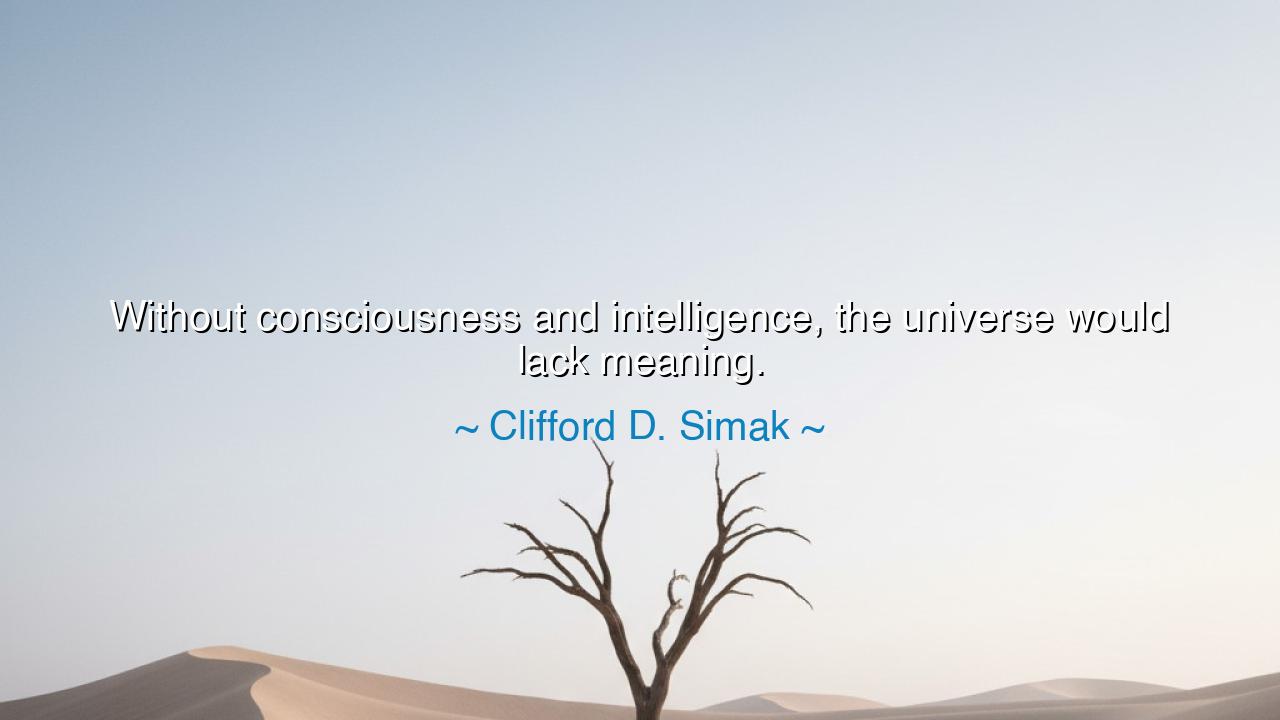
Without consciousness and intelligence, the universe would lack






When Clifford D. Simak declared, “Without consciousness and intelligence, the universe would lack meaning,” he spoke as one who had gazed into the great abyss of existence and found that the stars themselves are silent until mind gives them voice. His words are both humble and cosmic, for they carry the ancient understanding that creation, vast though it is, becomes truly alive only through awareness. In them lies a truth older than science and as eternal as spirit: the universe, in all its splendor, becomes meaningful only when consciousness awakens to behold it.
Simak was a writer of speculative worlds, a craftsman of ideas who wandered through the fields of science fiction not to escape reality, but to explore its deepest mysteries. His stories often revealed a profound reverence for both humanity and the cosmos. He saw that intelligence—whether human or alien, organic or mechanical—was not merely an evolutionary accident, but the mirror through which the universe contemplates itself. In this quote, he gives voice to the idea that meaning does not reside in matter, but in mind. The mountains, the galaxies, and the seas may exist, but without consciousness to perceive them, they are but mute and indifferent forms. It is thought that turns existence into experience, and experience into meaning.
The ancients spoke of this mystery in their own ways. In the Upanishads of India, the sages wrote, “The Self is the light of all lights; by It the world is known.” To them, consciousness was not a product of the universe—it was the essence behind it, the divine witness through which all things gained reality. The Greek philosopher Plotinus echoed this when he taught that the world is but a reflection of the One Mind, and that to know oneself is to know the source of all. Simak’s modern reflection, born in the age of technology and reason, stands in harmony with these ancient truths. He, too, understood that the cosmos without consciousness is a magnificent emptiness, a body without a soul.
Let us look to the example of Galileo, who first turned his telescope toward the heavens. The stars he saw had burned for millennia, yet until that moment, no human eye had truly known them. Through his intelligence, the cold fire of the heavens was transformed into wonder and discovery. The universe did not change, but its meaning did—because one conscious mind chose to seek understanding. Thus, through knowledge, man became not just an inhabitant of the cosmos, but its interpreter. In every age since, that same spark of inquiry has illuminated creation, proving Simak’s vision true: that the worth of the universe lies in the curiosity of the mind that beholds it.
Yet Simak’s words carry not only awe, but responsibility. For if meaning resides in consciousness, then the burden of meaning rests upon us. To be aware is to be a steward of existence. The wise know that the privilege of intelligence is not idle wonder, but active creation—the shaping of life, art, and compassion. Without our empathy, the stars are cold; without our ethics, knowledge becomes perilous. Consciousness, therefore, must not only perceive—it must care. For to be intelligent without love is to return the universe to emptiness.
From this teaching we draw a lesson of deep consequence: awaken fully to your own consciousness, for it is your bridge to the eternal. When you think, when you feel, when you create or love, you are giving voice to the cosmos itself. Live not as one who drifts through the world blindly, but as one who illumines it through awareness. Every act of thought, every pursuit of truth, every expression of kindness brings greater meaning to the whole of existence.
Thus, let this wisdom be engraved in the heart of every seeker: meaning is not found—it is made, through consciousness and intelligence. The stars may burn for eons, but it is only through the eyes of the awakened that they shine with purpose. Be therefore both observer and participant in the vastness of being. Think deeply, love greatly, and see the universe not as an indifferent void, but as the sacred stage upon which awareness fulfills its destiny—to give creation its meaning through mind, and its soul through understanding.






AAdministratorAdministrator
Welcome, honored guests. Please leave a comment, we will respond soon